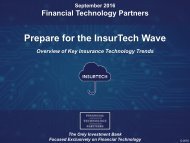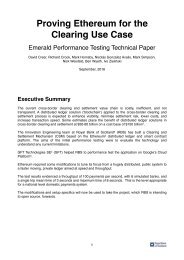Bitcoin and Cryptocurrency Technologies
1Qqc4BN
1Qqc4BN
Create successful ePaper yourself
Turn your PDF publications into a flip-book with our unique Google optimized e-Paper software.
Recall that you are free to create as many <strong>Bitcoin</strong> addresses as you like. With this in mind, you might<br />
be wondering whether <strong>Bitcoin</strong> addresses really are pseudo-identities considering that you can create<br />
as many of these pseudonyms as you like. As we’ll see, this still does not make <strong>Bitcoin</strong> anonymous.<br />
In computer science, anonymity refers to pseudonymity together with unlinkability. Unlinkability is a<br />
property that’s defined with respect to the capabilities of a specific adversary. Intuitively, unlinkability<br />
means that if a user interacts with the system repeatedly, these different interactions should not be<br />
able to be tied to each other from the point of view of the adversary in consideration.<br />
Sidebar.The distinction between anonymity <strong>and</strong> mere pseudonymity is something that you might<br />
be familiar with from a variety of other contexts. One good example is online forums. On a forum<br />
like Reddit, you pick a long-term pseudonym <strong>and</strong> interact over a period of time with that<br />
pseudonym. You could create multiple pseudonyms, or even a new one for every comment, but<br />
that would be tedious <strong>and</strong> annoying <strong>and</strong> most people don’t do it. So interacting on Reddit is usually<br />
pseudonymous but not quite anonymous. 4Chan, by contrast, is an online forum in which users<br />
generally post anonymously — with no attribution at all.<br />
<strong>Bitcoin</strong> is pseudonymous, but pseudonymity is not enough if your goal is to achieve privacy. Recall<br />
that the block chain is public <strong>and</strong> anyone can look up all <strong>Bitcoin</strong> transactions that involved a given<br />
address. If anyone is ever able to link your <strong>Bitcoin</strong> address to your real world identity, then all of your<br />
transactions — past, present, <strong>and</strong> future — will have been linked back to your identity.<br />
To make things worse, linking a <strong>Bitcoin</strong> address to a real-world identity is often easy. If you interact<br />
with a <strong>Bitcoin</strong> business — be it an online wallet servics, exchange, or other merchant — they are<br />
usually going to want your real life identity in order to let you transact with them. For example, an<br />
exchange might require your credit card details, while a merchant will need your shipping address.<br />
Or you might go to a coffee shop <strong>and</strong> pay for your coffee with bitcoins. Since you're physically present<br />
in the store, the barista knows a lot about your identity even if they don't ask for your real name. Your<br />
physical identity thus gets tied to one of your <strong>Bitcoin</strong> transactions, making all the other transactions<br />
that involved that address linkable to you. This is clearly not anonymous.<br />
Side channels. Even if a direct linkage doesn't happen, your pseudonymous profile can be<br />
deanonymizeddue to side channels, or indirect leakages of information. For example, someone may<br />
look at a profile of pseudonymous <strong>Bitcoin</strong> transactions <strong>and</strong> note at what times of day that user is<br />
active. They can correlate this information with other publicly available information. Perhaps they’ll<br />
notice that some Twitter user is active during roughly same time intervals, creating a link between the<br />
pseudonymous <strong>Bitcoin</strong> profile <strong>and</strong> a real-world identity (or at least a Twitter identity). Clearly<br />
pseudonymity does not guarantee privacy or anonymity. To achieve those, we require the stronger<br />
property of unlinkability as well.<br />
166









